<< Previous | Displaying results 4601-4650 of 6769 for "" | Next >>
Ida Baehr Lang holding her infant daughter, Freya Karoline, in Lambsheim. Ida died in the mid-1940s after deportation to Auschwitz. Freya survived in hiding in France and reunited with her father in 1946. Lambsheim, Germany, ca. 1934.
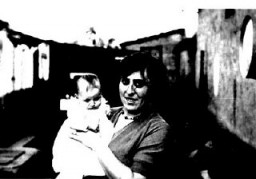
Dutch Seventh-day Adventist Johan Weidner headed the rescue organization "Dutch-Paris," which smuggled Jewish refugees into Switzerland and Spain. France, ca. 1940.
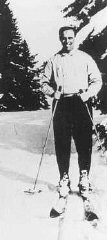
Jewish refugees from France and the Netherlands make their way from France into Spain through a pass in the Pyrenees mountain range. They are being rescued by "Dutch-Paris," an organization created by Seventh-day Adventist Johan Weidner. Ca. 1940.
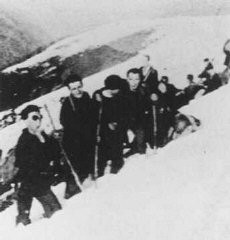
Portrait of the Rosenblat family in interwar Poland. Photographed are: (back row from left to right) Elya, Jozef (father), and Itzik Rosenblat. Sitting from left to right are: Herschel, Deena (wife of Elya), Hannah (mother), and Taube Rosenblat (wife of Itzik). In 1941, a mobile killing unit killed Herschel in Slonim, Poland. Of the others, only Itzik and Deena survived deportation from the ghetto in Radom, Poland.
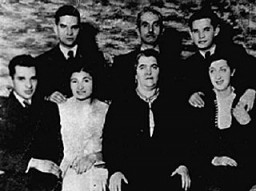
Portrait of David Aruti, son of Isak Aruti. He was a merchant and lived at Zvornitska 26 in Bitola. This photograph was one of the individual and family portraits of members of the Jewish community of Bitola, Macedonia, used by Bulgarian occupation authorities to register the Jewish population prior to its deportation in March 1943.
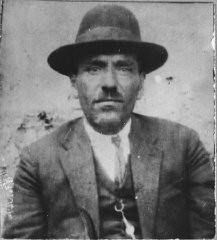
Portrait of Victoria and Isak Assael, the daughter and son of Shabetai Assael. They were students and lived at Sremska 9 in Bitola. This photograph was one of the individual and family portraits of members of the Jewish community of Bitola, Macedonia, used by Bulgarian occupation authorities to register the Jewish population prior to its deportation in March 1943.
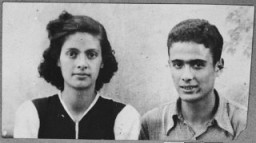
Portrait of Hana Ergas, wife of Isak Ergas. She lived at Zmayeva 20 in Bitola. This photograph was one of the individual and family portraits of members of the Jewish community of Bitola, Macedonia, used by Bulgarian occupation authorities to register the Jewish population prior to its deportation in March 1943.
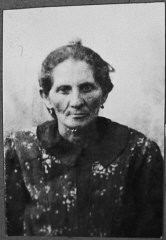
Portrait of Buena Eschkenasi, daughter of Bohor Eschkenasi. She lived at Zmayeva 10 in Bitola. This photograph was one of the individual and family portraits of members of the Jewish community of Bitola, Macedonia, used by Bulgarian occupation authorities to register the Jewish population prior to its deportation in March 1943.
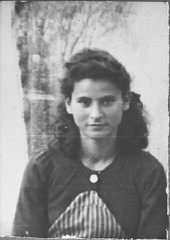
Portrait of Yosef Eschkenasi and his wife, Sara. Yosef was a laborer. They lived at Zmayeva 10 in Bitola. This photograph was one of the individual and family portraits of members of the Jewish community of Bitola, Macedonia, used by Bulgarian occupation authorities to register the Jewish population prior to its deportation in March 1943.
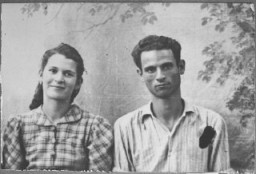
Portrait of Ester Eschkenasi, wife of Sava Eschkenasi. She lived at Karagoryeva 91 in Bitola. This photograph was one of the individual and family portraits of members of the Jewish community of Bitola, Macedonia, used by Bulgarian occupation authorities to register the Jewish population prior to its deportation in March 1943.
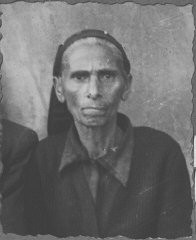
Portrait of Sara Israel, wife of Isak Israel. She lived at Krstitsa 10 in Bitola. This photograph was one of the individual and family portraits of members of the Jewish community of Bitola, Macedonia, used by Bulgarian occupation authorities to register the Jewish population prior to its deportation in March 1943.
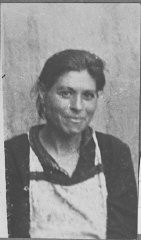
Portrait of Lazar Ischach, son of Yosef Ischach. He was a grocer and lived at Drinska 77 in Bitola. This photograph was one of the individual and family portraits of members of the Jewish community of Bitola, Macedonia, used by Bulgarian occupation authorities to register the Jewish population prior to its deportation in March 1943.
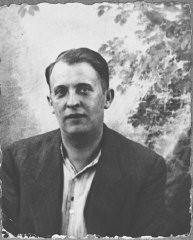
Portrait of Sara Ischach, wife of Lazar Ischach. She lived at Drinksa 77 in Bitola. This photograph was one of the individual and family portraits of members of the Jewish community of Bitola, Macedonia, used by Bulgarian occupation authorities to register the Jewish population prior to its deportation in March 1943.
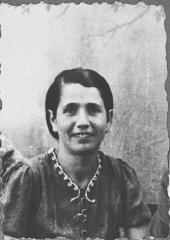
Portrait of Solomon Kalderon, son of Bohor Kalderon. He was a tailor and lived at Karagoryeva 67 in Bitola. This photograph was one of the individual and family portraits of members of the Jewish community of Bitola, Macedonia, used by Bulgarian occupation authorities to register the Jewish population prior to its deportation in March 1943.
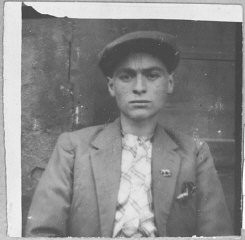
Portrait of Vida Kalderon, wife of Yakov Kalderon. She lived at Orisarska 2 in Bitola. This photograph was one of the individual and family portraits of members of the Jewish community of Bitola, Macedonia, used by Bulgarian occupation authorities to register the Jewish population prior to its deportation in March 1943.
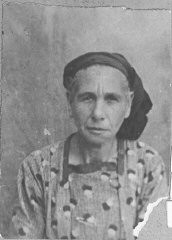
Portrait of Palomba Kalderon, daughter of Mushon Kalderon. She was a student and lived at Dalmatinska 65 in Bitola. This photograph was one of the individual and family portraits of members of the Jewish community of Bitola, Macedonia, used by Bulgarian occupation authorities to register the Jewish population prior to its deportation in March 1943.
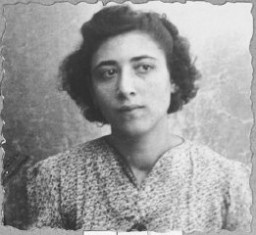
Portrait of David Kamchi, son of Masliach Kamchi, and his wife Sara. They lived at Gostivarska 3 in Bitola. This photograph was one of the individual and family portraits of members of the Jewish community of Bitola, Macedonia, used by Bulgarian occupation authorities to register the Jewish population prior to its deportation in March 1943.
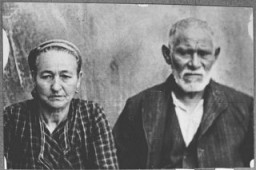
Portrait of David Pesso. He was a dealer of second-hand items. He lived at Novatska 4 in Bitola. This photograph was one of the individual and family portraits of members of the Jewish community of Bitola, Macedonia, used by Bulgarian occupation authorities to register the Jewish population prior to its deportation in March 1943.
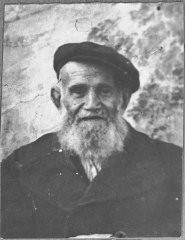
Portrait of Estreya Kolonomos, wife of Isak Kolonomos. She lived at Novatska 23 in Bitola. This photograph was one of the individual and family portraits of members of the Jewish community of Bitola, Macedonia, used by Bulgarian occupation authorities to register the Jewish population prior to its deportation in March 1943.
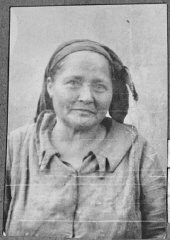
Portrait of an unidentified family of eight adults and three children in Bitola. This photograph was one of the individual and family portraits of members of the Jewish community of Bitola, Macedonia, used by Bulgarian occupation authorities to register the Jewish population prior to its deportation in March 1943.
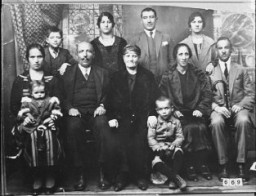
Portrait of Mordechai Mishulam. He was a dealer of second-hand items. He lived at Zmayeva 23 in Bitola. This photograph was one of the individual and family portraits of members of the Jewish community of Bitola, Macedonia, used by Bulgarian occupation authorities to register the Jewish population prior to its deportation in March 1943.
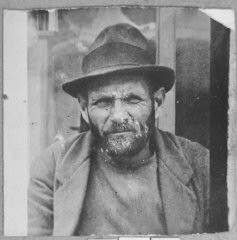
Portrait of Leon Pardo. He lived on Sremska in Bitola. This photograph was one of the individual and family portraits of members of the Jewish community of Bitola, Macedonia, used by Bulgarian occupation authorities to register the Jewish population prior to its deportation in March 1943.
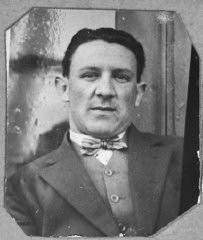
Portrait of the family of Bohor Kalderon. This photograph was one of the individual and family portraits of members of the Jewish community of Bitola, Macedonia, used by Bulgarian occupation authorities to register the Jewish population prior to its deportation in March 1943.
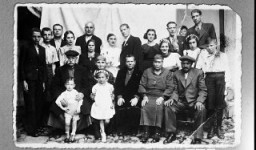
Portrait of Yakov Testa with wife and three children in Bitola. This photograph was one of the individual and family portraits of members of the Jewish community of Bitola, Macedonia, used by Bulgarian occupation authorities to register the Jewish population prior to its deportation in March 1943.
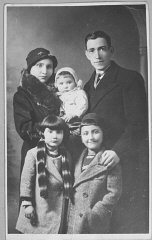
Portrait of two schoolchildren: Solomon Faradji, son of Avram Faradji, and Sami Levi, son of Rafael Levi. Solomon lived at Karagoryeva 113, and Sami lived at Karagoryeva 105, in Bitola. This photograph was one of the individual and family portraits of members of the Jewish community of Bitola, Macedonia, used by Bulgarian occupation authorities to register the Jewish population prior to its deportation in March 1943.
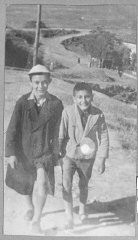
Portrait of Rabbi S. Djain, taken in Bitola. This photograph was one of the individual and family portraits of members of the Jewish community of Bitola, Macedonia, used by Bulgarian occupation authorities to register the Jewish population prior to its deportation in March 1943.
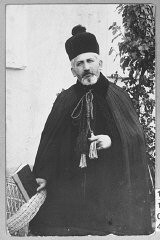
Portrait of two Jewish girls dressed in traditional Macedonian costume in a private home in Bitola. Pictured are Matilda Kamchi (or Camhi, left) and a friend. Both perished in Treblinka. Bitola, 1937.
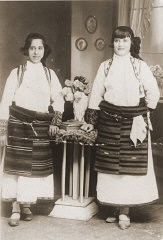
Portrait of the family of Mushon and Rebeka Kamchi in Bitola. Isak Kamchi is pictured in the front row at the right. Isak was born in Bitola. Several of his siblings and cousins left Macedonia for Palestine and North America before the war. During World War II, Isak served as the leader of a partisan unit operating in Croatia. He established a safehouse at his parent's home in Zagreb where partisans could rest and recuperate. His mother ran the safehouse, cooking for the men and nursing them back to…
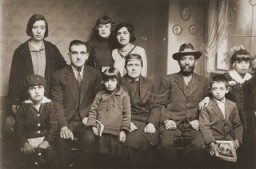
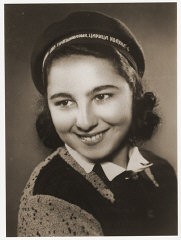
Members of a soccer team in Bitola pose in the goal of a sports field. August 14, 1928.
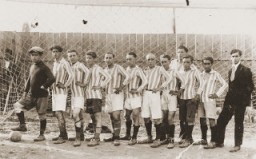
A group of Macedonian Jewish youth, members of a band, pose with their instruments on a makeshift stage in Bitola. September 18, 1930.
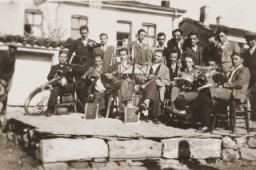
Group portrait of children holding their diplomas at a school in Bitola. Between 1925 and 1938.
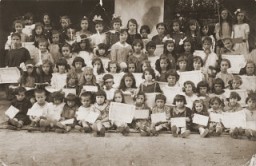
Jews from Bulgarian-occupied Macedonia who were rounded up and assembled at the Tobacco Monopoly transit camp in Skopje before deportation to the Treblinka killing center. Skopje, Yugoslavia, March 1943. The Jews of Bulgarian-occupied Thrace and Macedonia were deported in March 1943. On March 11, 1943, over 7,000 Macedonian Jews from Skopje, Bitola, and Stip were rounded up and assembled at the Tobacco Monopoly in Skopje, whose several buildings had been hastily converted into a transit camp. The…
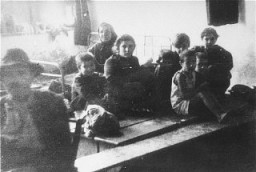
Jews load a barrel of water onto a deportation train in Skopje. In March 1943, Jews of Macedonia were rounded up and assembled at the Tobacco Monopoly in Skopje, where several building had been converted into a transit camp. Bulgarian occupation authorities deported them by train to the Treblinka killing center. Skopje, Yugoslavia, March 1943.
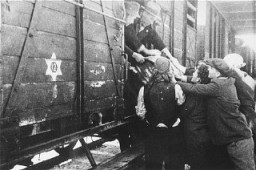
Jews from Bulgarian-occupied Macedonia interned at the "Monopol" tobacco factory, used as a transit camp, before deportation to the Treblinka killing center. Skopje, Yugoslavia, March 1943.
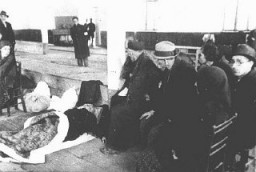
A family of Macedonian Jews carries their luggage down a flight of stairs as they leave the Tobacco Monopoly transit camp for the deportation trains. Skopje, Yugoslavia, March 1943.
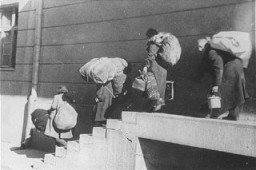
Macedonian Jews leave the Tobacco Monopoly transit camp in Skopje for the deportation trains. Skopje, Yugoslavia, March 1943. The Jews of Bulgarian-occupied Thrace and Macedonia were deported in March 1943. On March 11, 1943, over 7,000 Macedonian Jews from Skopje, Bitola, and Stip were rounded up and assembled at the Tobacco Monopoly in Skopje, whose several buildings had been hastily converted into a transit camp. The Macedonian Jews were kept there between eleven and eighteen days, before being…
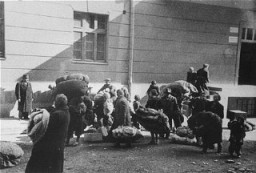
A family of Macedonian Jews in the Tobacco Monopoly transit camp in Skopje before deportation. Skopje, Yugoslavia, March 1943. The Jews of Bulgarian-occupied Thrace and Macedonia were deported in March 1943. On March 11, 1943, over 7,000 Macedonian Jews from Skopje, Bitola, and Stip were rounded up and assembled at the Tobacco Monopoly in Skopje, whose several buildings had been hastily converted into a transit camp. The Macedonian Jews were kept there between eleven and eighteen days,…
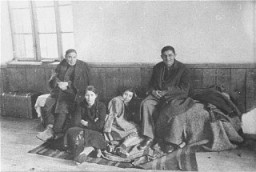
Group portrait of children dressed in Purim costumes. Danzig, 1930-1939.
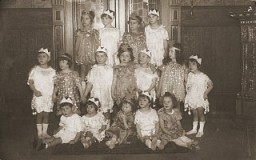
Purim portrait of a kindergarten class at the Reali Hebrew gymnasium. Kovno, Lithuania, March 5, 1939.
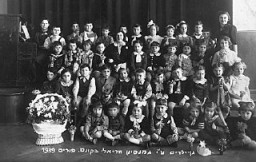
Alice and Heinrich Muller pose for a photograph while in costume for the Purim holiday. Hlohovec, Czechoslovakia, ca. 1934–35.
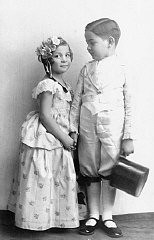
Group portrait of students at the Beis Yaakov religious school for girls dressed in costumes to celebrate the holiday of Purim. Kolbuszowa, Poland, March 1938.
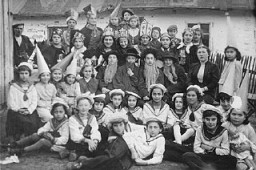
Tom (left) and Wolf Stein (right), dressed in Turkish-style costumes, attend a party celebrating the Jewish holiday of Purim. Hamburg, Germany, 1936.
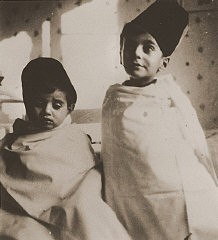
Members of the Chug Ivri (Hebrew Club) in Berlin celebrate Purim with food and song. On the wall is an advertisement for Juedische Rundschau, the newspaper of the German Zionist movement. Berlin, Germany, 1935.
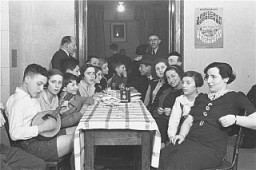
Members of Chug Ivri (Hebrew Club) of Berlin celebrate Purim. While the man in the tallis (prayer shawl) chants the story of Purim from the scroll, a young boy stands ready to use his grogger (noisemaker) to drown out the recitation of the name of Haman, the villain of the story. Berlin, Germany, 1935.
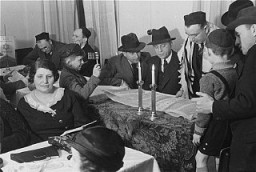
Members of the Chug Ivri (Hebrew Club) in Berlin enjoy a festive meal in celebration of Purim. Berlin, Germany, 1935.
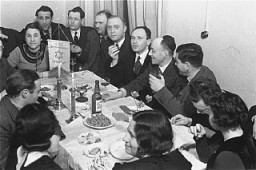
The footbridge over Zgierska Street that joined the two parts of the Lodz ghetto. The street itself was not part of the ghetto. Leon Jakubowicz's model of the Lodz ghetto recreates, on a small scale, the physical appearance of the ghetto, creating the shape of the model to mimic the exact boundaries, streets, and buildings that had a major impact on daily life in the ghetto. Lodz, Poland, ca. 1941. During the Holocaust, the creation of ghettos was a key step in the Nazi process of brutally separating,…
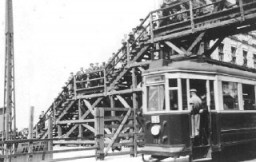
Selma Schwarzwald with her mother, Laura, in Lvov, Poland, September 1938.
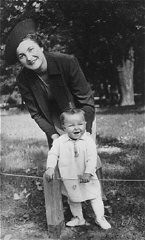
Document issued by the Regional Agricultural Mercantile Cooperative in Busko-Zdroj certifying that Bronislawa Tymejko (the false identity of Sophie Schwarzwald's mother, Laura Schwarzwald) was employed by the cooperative, dated November 1942.
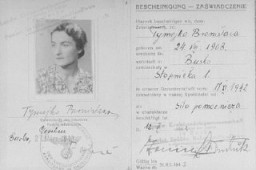
Selma Schwarzwald poses outside while wearing her first communion dress. Selma lived in hiding as a Polish Catholic during the war. Busko-Zdroj, Poland, 1945.
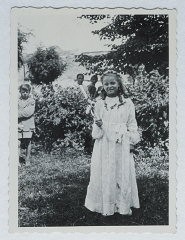
We would like to thank Crown Family Philanthropies, Abe and Ida Cooper Foundation, the Claims Conference, EVZ, and BMF for supporting the ongoing work to create content and resources for the Holocaust Encyclopedia. View the list of donor acknowledgement.